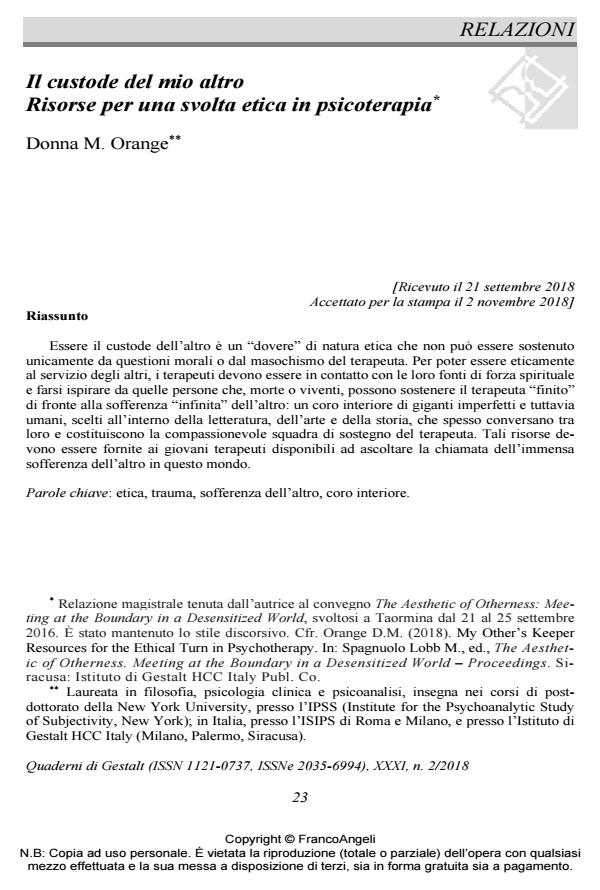My Other’s Keeper. Resources for the Ethical Turn in Psychotherapy
Journal title QUADERNI DI GESTALT
Author/s Donna M. Orange
Publishing Year 2018 Issue 2018/2
Language Italian Pages 16 P. 23-38 File size 217 KB
DOI 10.3280/GEST2018-002004
DOI is like a bar code for intellectual property: to have more infomation
click here
Below, you can see the article first page
If you want to buy this article in PDF format, you can do it, following the instructions to buy download credits

FrancoAngeli is member of Publishers International Linking Association, Inc (PILA), a not-for-profit association which run the CrossRef service enabling links to and from online scholarly content.
Being the other’s keeper is an ethically based "call on duty", instead of being sustained by mere moral issues or masochism of the therapist. In order to be at the ethical service of others, therapists need to be connected with their own forces of spiritual strength and be inspired by those characters, whether dead or alive, who can sustain the "finite" therapist in front of the "infinite" other’s suffering: an internal choir of imperfect giants and yet humans, chosen among literature, art and history, who are often in conversation one with another and constitute the compassionate helping team of the therapist. Such a resource is to be given to young therapists willing to follow the call of the other’s immense suffering in this world.
Keywords: Ethics, trauma, other’s suffering, internal choir.
- Contesto e complessità nella psicoterapia della Gestalt e nel modello psicoanalitico di Donna Orange Margherita Spagnuolo Lobb, in QUADERNI DI GESTALT 1/2025 pp.11
DOI: 10.3280/qg2025-1oa20067 - La supervisione in psicoterapia della Gestalt: la prospettiva situazionale come antidoto contro la vergogna Margherita Spagnuolo Lobb, in QUADERNI DI GESTALT 1/2024 pp.27
DOI: 10.3280/qg2024-1oa17952 - Milano, 15-16 novembre 2024: "Psicoterapia della Gestalt e Psicoanalisi contemporanee in dialogo" Loretta Grassettini, Lorenzo Danesini, Elisabetta Conte, Lynne Jacobs, Paolo Migone, Dan Bloom, in QUADERNI DI GESTALT 1/2025 pp.29
DOI: 10.3280/qg2025-1oa19320 - Il burnout del terapeuta: il cortocircuito emotivo del guaritore ferito Giuseppe Sampognaro, in QUADERNI DI GESTALT 1/2023 pp.29
DOI: 10.3280/GEST2023-001003
Donna M. Orange, Il custode del mio altro. Risorse per una svolta etica in psicoterapia in "QUADERNI DI GESTALT" 2/2018, pp 23-38, DOI: 10.3280/GEST2018-002004